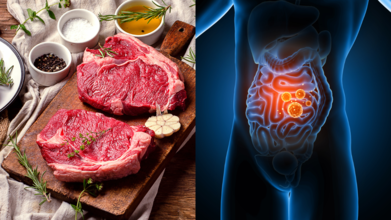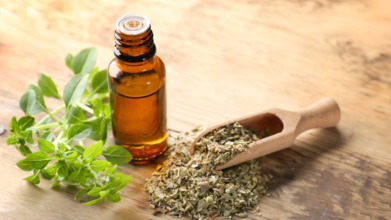- Health Conditions A-Z
- Health & Wellness
- Nutrition
- Fitness
- Health News
- Ayurveda
- Videos
- Medicine A-Z
- Parenting
- Web Stories
Common Cooking Oil Ingredient May Cause Your Breast Cancer

Credits: Canva
A new study, titled: Direct sensing of dietary ω-6 linoleic acid through FABP5-mTORC1 signaling,
has sparked concerns about an ingredient commonly found in household kitchens—linoleic acid. This omega-6 fatty acid, present in several cooking oils like soybean and safflower oil, may increase the risk of developing a particularly aggressive form of breast cancer known as triple-negative breast cancer (TNBC).
What Is Linoleic Acid and Where Is It Found?
Linoleic acid is a type of polyunsaturated fat, primarily found in seed oils such as corn, sunflower, soybean, and safflower oil. It's also present in some animal products like pork and eggs. While omega-6 fatty acids are essential for our health, recent findings suggest that an overconsumption—especially in the form of refined cooking oils—could have serious consequences.
The Link to Triple-Negative Breast Cancer
According to a preclinical study conducted by Weill Cornell Medicine and published in Science, linoleic acid appears to fuel the growth of TNBC cells. Researchers discovered that this fatty acid activates a key growth pathway in tumor cells by binding to a protein called FABP5, which is found in high amounts in triple-negative tumors. In mouse models, a diet high in linoleic acid significantly enhanced tumor growth.
Triple-negative breast cancer is more invasive, tends to spread quickly, and has fewer treatment options. Its survival rate is about 77%, notably lower than the 90% for other types of breast cancer.
Why This Matters for Your Diet
Experts now caution against the excessive use of seed and vegetable oils high in linoleic acid. While not calling for complete elimination, they suggest moderating intake and balancing fats with healthier alternatives like olive oil or omega-3-rich sources such as flaxseeds and fatty fish. The study’s senior author, Dr. John Blenis, emphasized that these findings can help personalize dietary recommendations for individuals at higher cancer risk.
Is Cancer Risk Only About Diet? Not Quite
While diet plays a role, about 5% to 10% of cancers, including breast cancer, result from inherited genetic mutations. If multiple members of your family have had breast or related cancers, you may be at increased risk due to mutations such as BRCA1 or BRCA2.
Genetic testing is a simple and non-invasive way to assess your risk. It involves a cheek swab, saliva, or blood sample and can screen for over 100 different gene mutations.
What to Do If You Test Positive for a Cancer Gene
A positive test result doesn’t mean you’ll definitely develop cancer—it just means your risk is higher. If you test positive:
- See a genetic counselor to understand your results and next steps
- Increase surveillance with regular screenings like mammograms or MRIs
- Consider preventive steps, including medication or surgery if recommended
- Make lifestyle changes—a healthy diet, exercise, and no smoking can reduce overall risk
- Inform family members so they can consider testing as well
What New About Cancer That We Know Of?
Scientists have uncovered how aspirin might help reduce the spread of certain cancers by boosting the immune system. The findings were published in the journal Nature, titled, Aspirin prevents metastasis by limiting platelet TXA2 suppression of T cell immunity. The findings could support the ongoing clinical trials and pave the way for more targeted use of aspirin in cancer treatment. This discovery can also now contribute to developing new drugs which are aimed at preventing cancer metastasis.
There have been previous studies which has shown how people who consume aspirin on a daily basis tend to have a lower risk of cancer spread. This works especially in breast, bowel and prostate cancers. However, researchers were unsure on how it actually played the role. This new study thus helps in finding that link and is conducted by the researchers at the University of Cambridge.
Cancer starts in one location, but in about 90% of cases, death occurs when it spreads to other parts of the body. Scientists have been studying the immune system’s role in this process, as cancer cells that detach from the main tumor are vulnerable to immune attack. While primary tumors can suppress the immune system, individual cancer cells that travel through the body are often more exposed, making them potential targets for treatment.
In a previous study, researcher screened 810 genes in mice and found that 15 of them influenced cancer metastasis. The researchers were able to discover that mice lacked a gene responsible for producing a protein called ARHGEF1 had fewer metastases in lungs and liver. The research also showed that ARHGEF1 suppresses T cells, which are immune cells that play an important role in killing metastatic cancer cells.
Beef, Pork, and Lamb Might Do More Than Fill You Up; Study Finds They Could Be Flaring Up Your Gut

Credits: Canva
Gaining weight by eating too many lamb chops or beef burgers is not the only risk. A new study published in Molecular Nutrition & Food Research suggests that red meat might be less of a comforting indulgence and more of a gut irritant. According to researchers at Capital Medical University in China, diets overloaded with pork, beef, or mutton could stoke inflammation inside the digestive system, potentially worsening gut-related disorders.
The Experiment
Scientists turned to an animal model. Mice were fed a diet high in red meat before being given a chemical that induces colitis, a condition that resembles inflammatory bowel disease (IBD) in humans. Results showed that the red-meat-fed mice experienced significant weight loss, shorter colons, and visible tissue damage. Their immune systems also went into overdrive, flooding the gut with inflammatory cells. Essentially, the study found that when the gut is already irritated, red meat makes the fire burn hotter.
All Red Meat Counts
Before you point fingers at beef or lamb individually, the researchers clarify that the issue is not with one specific type of red meat. The effect was observed across the board, whether it was pork, beef, or mutton. The common thread was the way red meat in general seemed to intensify inflammatory signals in the gut.
Gut Bugs in Trouble
One of the most striking findings was how red meat tampered with the gut microbiome—the trillions of tiny organisms that work quietly to regulate digestion and immunity. In the study, mice on red meat lost beneficial bacteria, particularly those that protect the gut lining and keep inflammation low. In their place, harmful microbes took over, making the digestive tract more vulnerable.
Why This Matters for Humans
While the experiment was done in mice, the implications for humans are worth paying attention to. People with conditions like Crohn’s disease or ulcerative colitis often report flare-ups after eating red meat. The study offers a possible explanation for this: the combination of heightened inflammation and a disrupted microbiome makes the gut more sensitive. For those already battling IBD, red meat might be less of a protein-packed friend and more of a troublemaker.
The Moderation Mantra
Does this mean you should swear off meat forever? Not necessarily. The researchers were clear that the study does not prove red meat directly causes IBD or that it should be completely eliminated from your plate. Instead, moderation seems to be the golden rule. If you do enjoy red meat, balance it out with plenty of fibre, fruits, vegetables, and lean proteins such as fish or chicken. A varied diet gives your gut a better chance of staying healthy and less inflamed.
Handle with Care
Red meat has long been under scrutiny for its links to heart disease and cancer risk, and now gut health joins the list of concerns. While more human studies are needed, the findings serve as a gentle nudge to reconsider how often you pile your plate with steak or kebabs. Your gut microbiome is like a delicate ecosystem. Treat it kindly, and it will return the favour.
Can Bananas Help You Build Muscle, Improve Digestion, and Gain Weight the Healthy Way?

Credits: Canva
When it comes to healthy eating, bananas often get underestimated. We usually treat it as a quick snack, but rarely do we stop to appreciate just how powerful this fruit can be. Bananas are not just about curbing midday hunger pangs; they can help you gain weight the right way, support muscle recovery, and even improve digestion.
The Banana as a Natural Energy Bar
“Banana is one of the high-protein fruits. It is also called a natural energy bar because of its rich nutrient profile,” says Nutritionist Anushi Jain. She explains that bananas act as both a quick energy source and a way to sustain fullness for longer periods.
That is because bananas are packed with carbohydrates, dietary fibre, and natural sugars like glucose, fructose, and sucrose. Together, these make bananas an effective food for anyone looking to put on weight in a healthy manner. But it is not just calories that make them special. Bananas also deliver a solid dose of potassium, vitamin B6, magnesium, and antioxidants, all of which contribute to overall health while promoting muscle recovery.
Calories That Count
One of the simplest reasons bananas work well for weight gain is their calorie content. A single medium banana provides around 100–120 calories, making them a convenient way to bump up your daily intake. But the real magic happens when you pair bananas with protein and healthy fats.
“When combined with foods like nut butters, milk, or seeds, bananas become a balanced meal that supports both muscle building and gradual, healthy weight gain,” adds Jain. In other words, instead of relying on protein powders or supplements, you can simply slip bananas into your everyday meals for better results.
Bananas and Better Digestion
Bananas do not just help you add calories; they also help you use them well. “Bananas are high in calories and important nutrients like potassium, vitamin B6, and fibre. They also help with digestion, making it easier for the body to absorb nutrients,” explains Dr Shabana Parveen, Head of Dietetics at Artemis Hospitals.
This means that adding bananas to your diet is not just about eating more but also about ensuring your body makes the most of the food you consume. Proper digestion is the backbone of healthy weight gain, and bananas play a quiet but crucial role here.
Easy Ways to Add Bananas Into Meals
Another reason bananas are a favourite among nutritionists is their versatility. They do not demand elaborate recipes or complicated meal prep. “Bananas slip into meals effortlessly,” says Jain.
Here are some easy ways to make the most of them:
- Smoothies: Blend bananas with milk, nut butter, oats, or seeds to create a calorie-dense shake that doubles as breakfast or a post-workout booster.
- Breakfast Bowls: Layer sliced bananas over oatmeal, porridge, or yoghurt for extra creaminess and a burst of energy.
- Nut-butter Pairing: Spread peanut or almond butter on banana slices for the perfect protein-fat-carb combo.
- Desserts: Use mashed bananas in muffins, pancakes, or healthy energy bars as a natural sweetener.
- Post-workout Snack: Pair bananas with whey protein or nuts to replenish glycogen and aid muscle repair.
- Frozen Treats: Blend frozen bananas into a creamy, guilt-free ice cream substitute.
“Bananas are a healthy choice for people who want to gain weight without eating processed foods,” Dr Parveen points out. Whether you mix them into shakes, mash them into bakes, or simply pair them with a handful of nuts, bananas deliver nutrition in the simplest, tastiest form.
Big Benefits
Can bananas help you build muscle, improve digestion, and gain weight the healthy way? The answer is a resounding yes. They are calorie-rich yet wholesome, versatile yet fuss-free, and packed with nutrients that go beyond just filling you up.
Both Jain and Dr Parveen agree that when combined with other nutrient-dense foods and regular exercise, bananas can become a powerful ally in your health journey. Whether your goal is to bulk up, repair muscles, or just keep your gut happy, the next time you reach for a snack, you might want to think banana.
Is Oil Of Oregano Really A 'Magic Cure'?

Credits: Canva
Oil of oregano, also known as oregano oil, is a concentrated extract derived from the leaves of the oregano plant. Typically available in liquid drops or capsule form, it has long been promoted for its potential health benefits, particularly during cold and flu season. Some people dilute it in water or juice, while others add it to their supplement routine.
For centuries, oregano oil has been praised in traditional remedies for its antimicrobial and immune-supporting properties. Modern studies suggest that compounds like carvacrol and thymol found in the oil may help fight certain bacteria, fungi and viruses, at least in laboratory and animal studies.
But experts caution against overestimating its power. As USA Today quotes Mascha Davis, MPH, RDN, a registered dietitian and nutritionist, “While oil of oregano can be part of a short-term wellness strategy, it’s not a magic cure-all.” Much of the evidence so far has not been tested in humans, making it difficult to draw strong conclusions about its effectiveness.
Why Was It Believed To Be A 'Magic Cure'?
Oregano has long been associated with Romans and Greeks and is said to trace back as early as 3000 BC, when it was used by Assyrians. It has been used in folk medicine for over many centuries and is extracted from the leaves of oregano. In the Middle Ages, the plant was considered a magic herb that could ward off witches and even the devil himself. This is why the oil extracted from it earned its name as the 'Magic Cure'.
Also Read: ‘Drink Castor Oil To Cleanse Your Colon,’ Says Sadhguru, But Science Isn’t Convinced
What It Can and Can’t Do
Research shows oregano oil does have antimicrobial and antioxidant properties, but clinical trials on humans remain limited. Benefits linked to digestion or immunity have largely been observed outside the human body, in cell or animal studies.
Who Should Avoid It
Despite its popularity, oil of oregano isn’t safe for everyone. Davis also advises that those who are iron deficient, pregnant, breastfeeding, allergic to mint, or taking certain medications, such as blood thinners or drugs for diabetes, should avoid it unless directed otherwise by a healthcare provider.
Even healthy individuals should use it with caution. Because it’s highly concentrated, taking too much or using it without dilution may irritate the gut lining. Experts recommend using it sparingly and only for short durations, such as a few days to a week, while closely following dosage instructions.
Read: The Truth About Cooking Oils: Which One Should You Really Use?
The Bigger Picture
Relying on oregano oil alone for long-term health isn’t sustainable. Experts emphasize that proven habits, like eating a nutrient-dense, plant-based diet, getting quality sleep, managing stress, and incorporating probiotics, are more effective for maintaining immunity and gut health in the long run.
The takeaway? Oil of oregano may have its place as a short-term supplement, but it’s not the all-in-one remedy it’s often marketed to be.
Read More: Common Cooking Oil Ingredient May Cause Your Breast Cancer
© 2024 Bennett, Coleman & Company Limited

